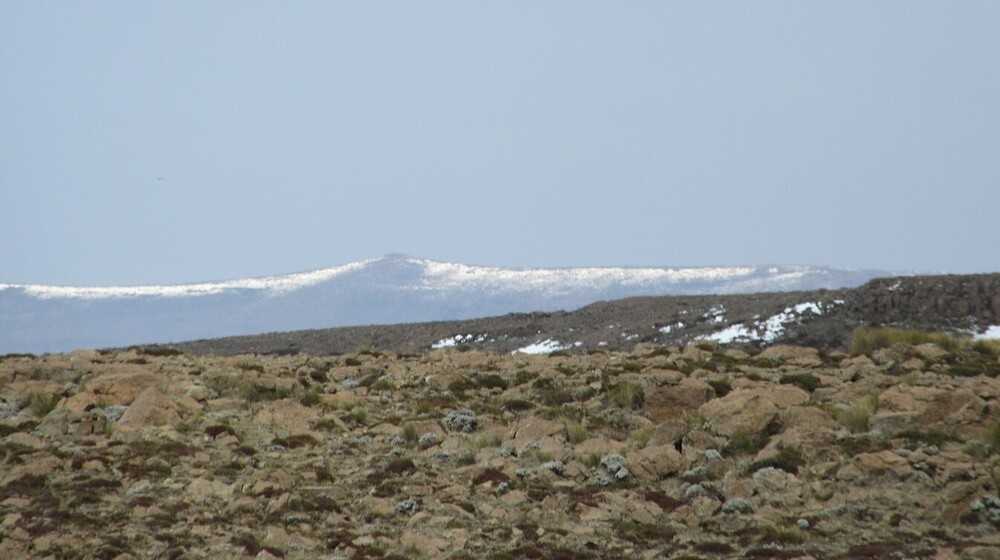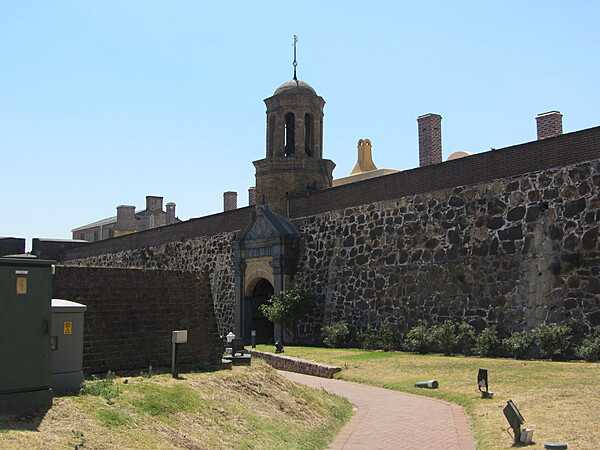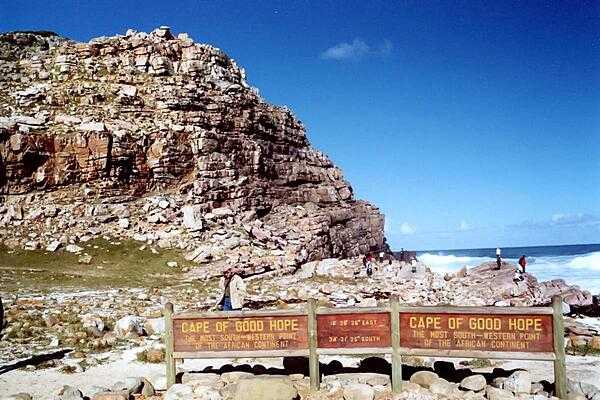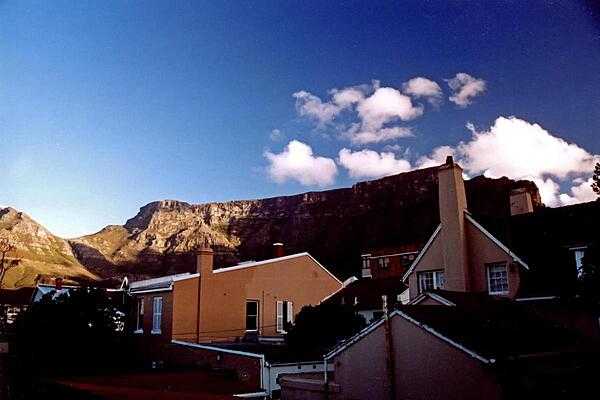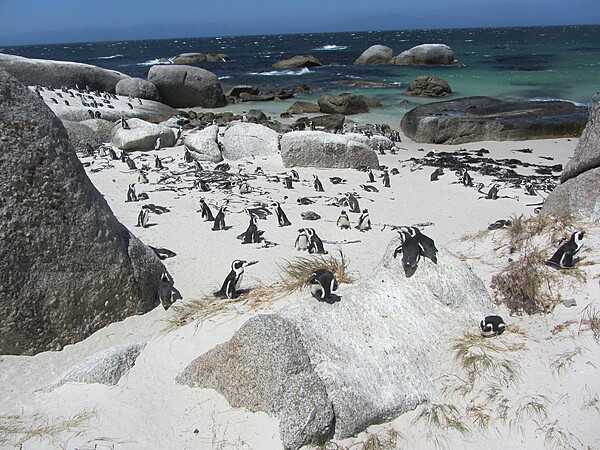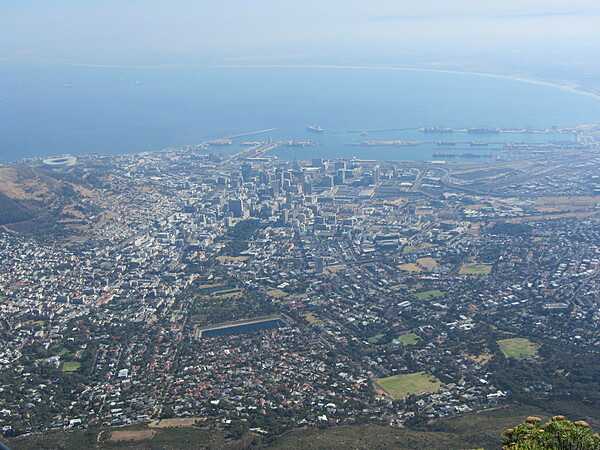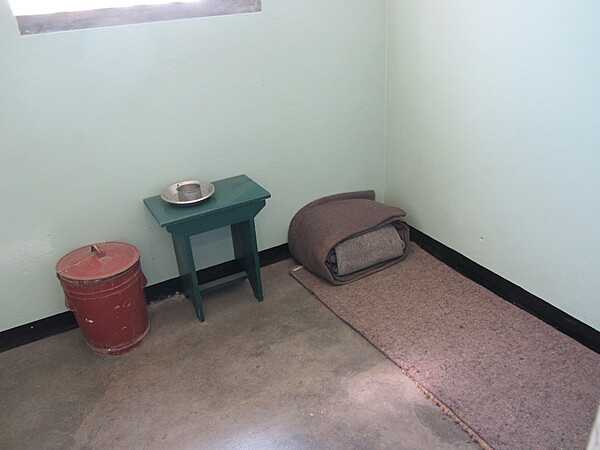South Africa - ZA - ZAF - RSA - Africa
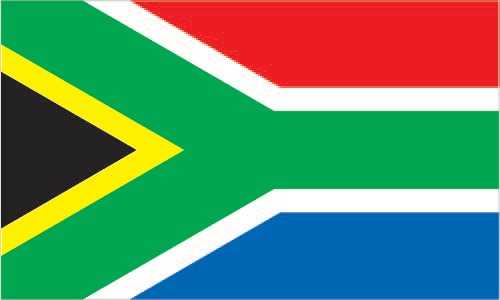
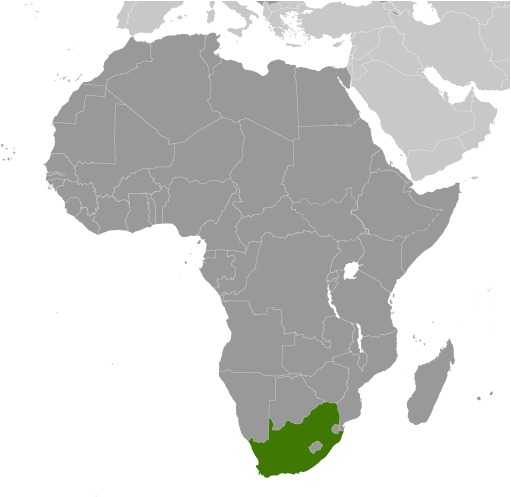
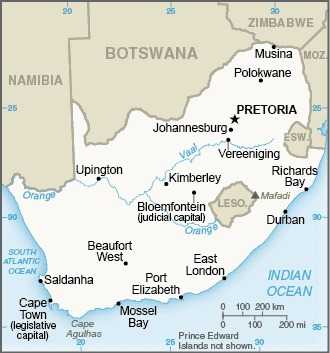
South Africa Images
South Africa Factbook Data
Diplomatic representation from the US
embassy: 877 Pretorius Street, Arcadia, Pretoria
mailing address: 9300 Pretoria Place, Washington DC 20521-9300
telephone: [27] (12) 431-4000
FAX: [27] (12) 342-2299
email address and website:
ACSJohannesburg@state.gov
https://za.usembassy.gov/
consulate(s) general: Cape Town, Durban, Johannesburg
Age structure
15-64 years: 65.3% (male 19,524,873/female 19,947,839)
65 years and over: 7.5% (2024 est.) (male 1,911,825/female 2,636,028)
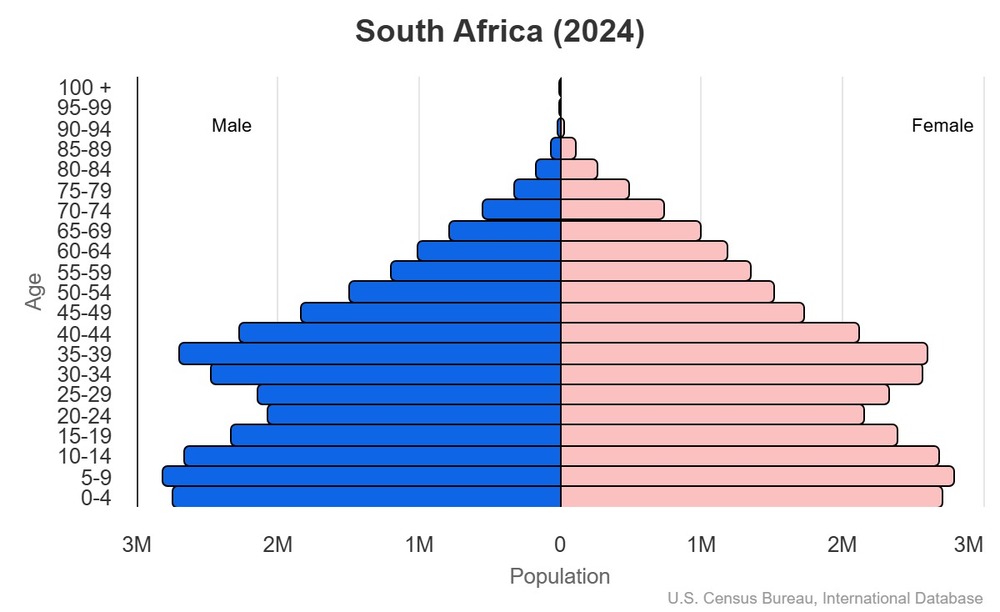
For additional information, please see the entry for Population pyramid on the Definitions and Notes page.
Geographic coordinates
Sex ratio
0-14 years: 1 male(s)/female
15-64 years: 0.98 male(s)/female
65 years and over: 0.73 male(s)/female
total population: 0.96 male(s)/female (2024 est.)
Natural hazards
volcanism: the volcano that formed Marion Island in the Prince Edward Islands is South Africa's only active volcano
Area - comparative
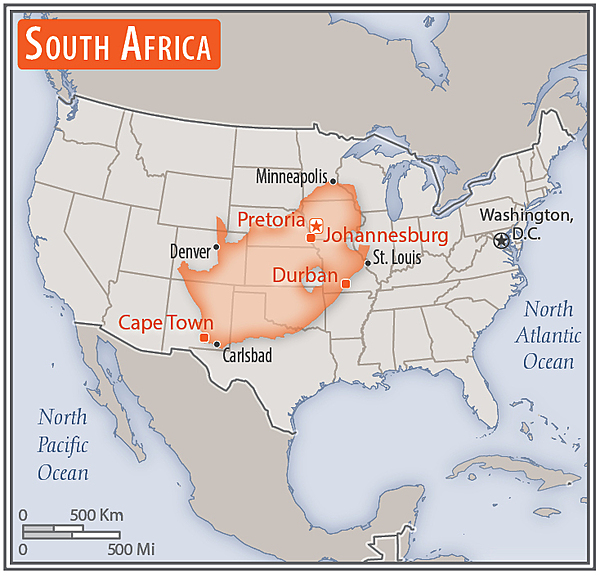
slightly less than twice the size of Texas
Military service age and obligation
note: in 2023, women comprised nearly 30% of the military
Background
Some of the earliest human remains in the fossil record were found in South Africa. By about A.D. 500, Bantu-speaking groups began settling into what is now northeastern South Africa, displacing Khoisan-speaking groups to the southwest. Dutch traders landed at the southern tip of present-day South Africa in 1652 and established a stopover point on the spice route between the Netherlands and the Far East, founding the city of Cape Town. After the British seized the Cape of Good Hope area in 1806, many settlers of Dutch descent -- known then as "Boers," or farmers, but later called Afrikaners -- trekked north to found their own republics, Transvaal and Orange Free State. In the 1820s, several decades of wars began as the Zulus expanded their territory, moving out of what is today southeastern South Africa and clashing with other indigenous peoples and the growing European settlements. The discovery of diamonds (1867) and gold (1886) spurred mass immigration, predominantly from Europe.
The Zulu kingdom's territory was incorporated into the British Empire after the Anglo-Zulu War in 1879, and the Afrikaner republics were incorporated after their defeat in the Second South African War (1899-1902). Beginning in 1910, the British and the Afrikaners ruled together under the Union of South Africa, which left the British Commonwealth to become a fully self-governing republic in 1961 after a Whites-only referendum. In 1948, the National Party was voted into power and instituted a policy of apartheid -– billed as "separate development" of the races -- which favored the White minority and suppressed the Black majority and other non-White groups. The African National Congress (ANC) led the resistance to apartheid, and many top ANC leaders such as Nelson MANDELA spent decades in South Africa's prisons. Internal protests and insurgency, as well as boycotts from some Western nations and institutions, led to the regime's eventual willingness to unban the ANC and negotiate a peaceful transition to majority rule.
The first multi-racial elections in 1994 ushered in majority rule under an ANC-led government. South Africa has since struggled to address apartheid-era imbalances in wealth, housing, education, and health care under successive administrations. President Cyril RAMAPHOSA, who was reelected as the ANC leader in 2022, has made some progress in reigning in corruption.
Environmental issues
International environmental agreements
signed, but not ratified: none of the selected agreements
Military expenditures
0.7% of GDP (2023 est.)
0.8% of GDP (2022 est.)
0.8% of GDP (2021 est.)
1.1% of GDP (2020 est.)
Exports - commodities
note: top five export commodities based on value in dollars
Exports - partners
note: top five export partners based on percentage share of exports
Administrative divisions
Agricultural products
note: top ten agricultural products based on tonnage
Military and security forces
Ministry of Police: South African Police Service (SAPS) (2025)
Budget
expenditures: $137.593 billion (2022 est.)
note: central government revenues (excluding grants) and expenditures converted to US dollars at average official exchange rate for year indicated
Capital
geographic coordinates: 25 42 S, 28 13 E
time difference: UTC+2 (7 hours ahead of Washington, DC, during Standard Time)
etymology: Pretoria was named in honor of Boer statesman Andries PRETORIUS in 1855; Cape Town's name refers to its location on the Cape of Good Hope; Bloemfontein was named after the farm on which it was built in 1846, whose name combined the Dutch words bloem (flower) and fontein (fountain)
Imports - commodities
note: top five import commodities based on value in dollars
Climate
Coastline
Constitution
amendment process: proposed by the National Assembly of Parliament; passage of amendments affecting constitutional sections on human rights and freedoms, non-racism and non-sexism, supremacy of the constitution, suffrage, the multi-party system of democratic government, and amendment procedures requires at least 75% majority vote of the Assembly, approval by at least six of the nine provinces represented in the National Council of Provinces, and assent of the president of the republic; passage of amendments affecting the Bill of Rights, and those related to provincial boundaries, powers, and authorities requires at least two-thirds majority vote of the Assembly, approval by at least six of the nine provinces represented in the National Council, and assent of the president
Exchange rates
Exchange rates:
18.329 (2024 est.)
18.45 (2023 est.)
16.356 (2022 est.)
14.779 (2021 est.)
16.459 (2020 est.)
Executive branch
head of government: President Matamela Cyril RAMAPHOSA (since 19 June 2024)
cabinet: Cabinet appointed by the president
election/appointment process: president indirectly elected by the National Assembly for a 5-year term (eligible for a second term)
most recent election date: 29 May 2024
election results:
2024: Matamela Cyril RAMAPHOSA (ANC) elected president by the National Assembly unopposed
2019: Matamela Cyril RAMAPHOSA (ANC) elected president by the National Assembly unopposed
expected date of next election: May 2029
note: the president is both chief of state and head of government
Flag
meaning: the colors have no official meaning, but the Y stands for "the convergence of diverse elements within South African society, taking the road ahead in unity"
note: South Africa has one of two national flags that display six colors as part of the primary design -- the other is South Sudan's
Illicit drugs
major precursor-chemical producer (2025)
Independence
Industries
Judicial branch
judge selection and term of office: Supreme Court of Appeals president and vice president appointed by the national president after consultation with the Judicial Services Commission (JSC), a 23-member body chaired by the chief justice; other Supreme Court judges appointed by the national president on the advice of the JSC and hold office until discharged from active service by an Act of Parliament; Constitutional Court chief and deputy chief justices appointed by the president of South Africa after consultation with the JSC and with heads of the National Assembly; other Constitutional Court judges appointed by the national president after consultation with the chief justice and leaders of the National Assembly; Constitutional Court judges serve 12-year nonrenewable terms or until age 70
subordinate courts: High Courts; Magistrates' Courts; labor courts; land claims courts
Land boundaries
border countries (6): Botswana 1,969 km; Lesotho 1,106 km; Mozambique 496 km; Namibia 1,005 km; Eswatini 438 km; Zimbabwe 230 km
Land use
arable land: 9.9% (2023 est.)
permanent crops: 0.3% (2023 est.)
permanent pasture: 69.2% (2023 est.)
forest: 18.7% (2023 est.)
other: 1.9% (2023 est.)
Legal system
Legislative branch
legislative structure: bicameral
Literacy
male: 91.5% (2024 est.)
female: 90.8% (2024 est.)
Maritime claims
contiguous zone: 24 nm
exclusive economic zone: 200 nm
continental shelf: 200 nm or to edge of the continental margin
International organization participation
National holiday
Nationality
adjective: South African
Natural resources
note: South Africa was the World's leading chromite ore producer in 2022 with an output of 18,000 mt
Geography - note
note 2: sometimes mistaken for the southernmost point of Africa, the Cape of Good Hope is more accurately described as the southwestern-most point of the African continent; Cape Agulhas, the meeting point of the Atlantic and Indian Oceans, is the southernmost point of the African continent
Economic overview
upper-middle-income, largest southern African economy; Government of National Unity facing slow growth, fiscal gaps, and structural challenges; high income inequality, unemployment, and poverty; reforms to address electricity generation, transport, and logistics; leading producer and exporter of critical minerals
Political parties
African Independent Congress or AIC
African National Congress or ANC
African People's Convention or APC
Agang SA
Congress of the People or COPE
Democratic Alliance or DA
Economic Freedom Fighters or EFF
Freedom Front Plus or FF+
GOOD
Inkatha Freedom Party or IFP
National Freedom Party or NFP
Pan-Africanist Congress of Azania or PAC
United Christian Democratic Party or UCDP
United Democratic Movement or UDM
Railways
standard gauge: 80 km (2021) 1.435-m gauge (80 km electrified)
narrow gauge: 19,756 km (2014) 1.065-m gauge (8,271 km electrified)
Suffrage
Terrain
Government type
Country name
conventional short form: South Africa
former: Union of South Africa
abbreviation: RSA
etymology: self-descriptive name from the country's location on the continent; "Africa" is derived from the Roman designation of the area corresponding to present-day Tunisia "Africa terra," which meant "Land of the Afri" (the tribe resident in that area), but which eventually came to mean the entire continent
Location
Map references
Irrigated land
Diplomatic representation in the US
chancery: 3051 Massachusetts Avenue NW, Washington, DC 20008
telephone: [1] (240) 937-5760
FAX: [1] (202) 265-1607
email address and website:
Info.saembassyDC@dirco.gov.za
https://www.saembassy.org/
consulate(s) general: Los Angeles, New York
Internet users
Internet country code
Refugees and internally displaced persons
IDPs: 7,385 (2024 est.)
GDP (official exchange rate)
note: data in current dollars at official exchange rate
Total renewable water resources
School life expectancy (primary to tertiary education)
male: 14 years (2022 est.)
female: 14 years (2022 est.)
Urbanization
rate of urbanization: 1.72% annual rate of change (2020-25 est.)
Broadcast media
Drinking water source
urban: 99.1% of population (2022 est.)
rural: 84.5% of population (2022 est.)
total: 94.5% of population (2022 est.)
unimproved:
urban: 0.9% of population (2022 est.)
rural: 15.5% of population (2022 est.)
total: 5.5% of population (2022 est.)
National anthem(s)
lyrics/music: Enoch SONTONGA and Cornelius Jacob LANGENHOVEN/Enoch SONTONGA and Marthinus LOURENS de Villiers
history: adopted 1997; a combination of "N'kosi Sikelel' iAfrica" (God Bless Africa) and "Die Stem van Suid Afrika" (The Call of South Africa), which were respectively the anthems of the non-white and white communities under apartheid; official lyrics contain a mixture of Xhosa, Zulu, Sesotho, Afrikaans, and English (the five most widely spoken of South Africa's 11 official languages)
Major urban areas - population
International law organization participation
Physician density
National symbol(s)
GDP - composition, by end use
government consumption: 19.2% (2024 est.)
investment in fixed capital: 14.5% (2024 est.)
investment in inventories: -0.6% (2024 est.)
exports of goods and services: 31.8% (2024 est.)
imports of goods and services: -29.9% (2024 est.)
note: figures may not total 100% due to rounding or gaps in data collection
Dependency ratios
youth dependency ratio: 41.6 (2024 est.)
elderly dependency ratio: 11.5 (2024 est.)
potential support ratio: 8.7 (2024 est.)
Citizenship
citizenship by descent only: at least one parent must be a citizen of South Africa
dual citizenship recognized: yes, but requires prior permission of the government
residency requirement for naturalization: 5 year
Population distribution
Electricity access
electrification - urban areas: 87.1%
electrification - rural areas: 93.4%
Civil aircraft registration country code prefix
Sanitation facility access
urban: 95.9% of population (2022 est.)
rural: 81.7% of population (2022 est.)
total: 91.4% of population (2022 est.)
unimproved:
urban: 4.1% of population (2022 est.)
rural: 18.3% of population (2022 est.)
total: 8.6% of population (2022 est.)
Ethnic groups
note: Colored is a term used in South Africa, including on the national census, for persons of mixed race ancestry who developed a distinct cultural identity over several hundred years
Religions
Languages
major-language sample(s):
Die Wereld Feite Boek, n’ onontbeerlike bron vir basiese informasie. (Afrikaans)
The World Factbook, the indispensable source for basic information. (English)
note: data represent language spoken most often at home
Imports - partners
note: top five import partners based on percentage share of imports
Elevation
lowest point: Atlantic/Indian Oceans 0 m
mean elevation: 1,034 m
Health expenditure
16.9% of national budget (2022 est.)
Military - note
the SANDF was created in 1994 to replace the South African Defense Force (SADF); the SANDF was opened to all South Africans who met military requirements, while the SADF was a mostly white force (only whites were subject to conscription) with non-whites only allowed to join in a voluntary capacity; the SANDF also absorbed members of the various anti-apartheid opposition groups, including the African National Congress, the Pan Africanist Congress, and the Inkatha Freedom Party, as well as the security forces of the formerly independent Bantustan homelands (2025)
Military and security service personnel strengths
Military deployments
Terrorist group(s)
note: details about the history, aims, leadership, organization, areas of operation, tactics, targets, weapons, size, and sources of support of the group(s) appear(s) in the Terrorism reference guide
Total water withdrawal
industrial: 4.616 billion cubic meters (2022)
agricultural: 11.839 billion cubic meters (2022)
Waste and recycling
percent of municipal solid waste recycled: 28.2% (2022 est.)
Average household expenditures
on alcohol and tobacco: 4.1% of household expenditures (2023 est.)
Trafficking in persons
Major aquifers
Major watersheds (area sq km)
Major rivers (by length in km)
note: [s] after country name indicates river source; [m] after country name indicates river mouth
National heritage
selected World Heritage Site locales: Fossil Hominid Sites of South Africa (c); iSimangaliso Wetland Park (n); Robben Island (c); Maloti-Drakensberg Park (m); Mapungubwe Cultural Landscape (c); Cape Floral Region Protected Areas (n); Vredefort Dome (n); Richtersveld Cultural and Botanical Landscape (c); Khomani Cultural Landscape (c); Barberton Makhonjwa Mountains (n); Human Rights, Liberation and Reconciliation: Nelson Mandela Legacy Sites (c); The Emergence of Modern Human Behaviour: The Pleistocene Occupation Sites of South Africa (c)
Child marriage
women married by age 18: 3.6% (2016)
men married by age 18: 0.6% (2016)
Coal
consumption: 176.095 million metric tons (2023 est.)
exports: 66.918 million metric tons (2023 est.)
imports: 3.301 million metric tons (2023 est.)
proven reserves: 9.893 billion metric tons (2023 est.)
Electricity generation sources
nuclear: 3.7% of total installed capacity (2023 est.)
solar: 2.9% of total installed capacity (2023 est.)
wind: 5.3% of total installed capacity (2023 est.)
hydroelectricity: 0.7% of total installed capacity (2023 est.)
biomass and waste: 0.2% of total installed capacity (2023 est.)
Natural gas
consumption: 3.834 billion cubic meters (2023 est.)
imports: 3.768 billion cubic meters (2023 est.)
Petroleum
refined petroleum consumption: 609,000 bbl/day (2023 est.)
crude oil estimated reserves: 15 million barrels (2021 est.)
Currently married women (ages 15-49)
Remittances
0.2% of GDP (2023 est.)
0.2% of GDP (2022 est.)
note: personal transfers and compensation between resident and non-resident individuals/households/entities
Nuclear energy
Net capacity of operational nuclear reactors: 1.85GW (2025 est.)
Percent of total electricity production: 4.4% (2023 est.)
Space program overview
Space launch site(s)
Space agency/agencies
Ports
large: 2
medium: 4
small: 1
very small: 1
ports with oil terminals: 7
key ports: Cape Town, Durban, Mossel Bay, Port Elizabeth, Richards Bay, Saldanha Bay
Legislative branch - lower chamber
number of seats: 400 (all directly elected)
electoral system: proportional representation
scope of elections: full renewal
term in office: 5 years
most recent election date: 6/15/2024
percentage of women in chamber: 44.7%
expected date of next election: May 2029
Legislative branch - upper chamber
number of seats: 90 (all appointed)
scope of elections: full renewal
term in office: 5 years
most recent election date: 5/29/2024
percentage of women in chamber: 44.4%
expected date of next election: June 2029
note: the Council has special powers to protect regional interests, including safeguarding cultural and linguistic traditions among ethnic minorities
National color(s)
Particulate matter emissions
Methane emissions
agriculture: 754.2 kt (2019-2021 est.)
waste: 770.2 kt (2019-2021 est.)
other: 32.1 kt (2019-2021 est.)
Key space-program milestones
1980s - conducted program to launch reconnaissance satellites on a domestically produced satellite launch vehicle (abandoned in 1994 along with nuclear program)
1999 - first domestically built RS/technology demonstrator microsatellite (Sunsat-1) launched by US
2009 - first government-owned and -operated RS/scientific/technology demonstrator satellite (SumbandilaSat) launched by Russia
2018 - inaugurated a radio space telescope array (Karoo Array Telescope or MeerKAT)
2021 - began construction of the international Square Kilometer Array radio telescope observatory; launched a sounding rocket for research purposes to an altitude of nearly 18,000 km (11,185 mi)
2022 - opened Africa's first regional space weather center
2023 - agreed to participate in China's international lunar research station project
Labor force
note: number of people ages 15 or older who are employed or seeking work
Youth unemployment rate (ages 15-24)
male: 57.1% (2024 est.)
female: 65.5% (2024 est.)
note: % of labor force ages 15-24 seeking employment
Debt - external
note: present value of external debt in current US dollars
Maternal mortality ratio
Reserves of foreign exchange and gold
$62.492 billion (2023 est.)
$60.553 billion (2022 est.)
note: holdings of gold (year-end prices)/foreign exchange/special drawing rights in current dollars
Public debt
note: central government debt as a % of GDP
Unemployment rate
32.1% (2023 est.)
33.3% (2022 est.)
note: % of labor force seeking employment
Population
male: 29,664,388
female: 30,778,259
Carbon dioxide emissions
from coal and metallurgical coke: 365.269 million metric tonnes of CO2 (2023 est.)
from petroleum and other liquids: 73.913 million metric tonnes of CO2 (2023 est.)
from consumed natural gas: 7.522 million metric tonnes of CO2 (2023 est.)
Area
land: 1,214,470 sq km
water: 4,620 sq km
note: includes Prince Edward Islands (Marion Island and Prince Edward Island)
Taxes and other revenues
note: central government tax revenue as a % of GDP
Real GDP (purchasing power parity)
$865.402 billion (2023 est.)
$859.399 billion (2022 est.)
note: data in 2021 dollars
Airports
Telephones - mobile cellular
subscriptions per 100 inhabitants: 167 (2022 est.)
Inflation rate (consumer prices)
6.1% (2023 est.)
7% (2022 est.)
note: annual % change based on consumer prices
Current account balance
-$6.143 billion (2023 est.)
-$1.878 billion (2022 est.)
note: balance of payments - net trade and primary/secondary income in current dollars
Real GDP per capita
$13,700 (2023 est.)
$13,800 (2022 est.)
note: data in 2021 dollars
Broadband - fixed subscriptions
subscriptions per 100 inhabitants: 3 (2023 est.)
Tobacco use
male: 35.3% (2025 est.)
female: 6% (2025 est.)
Obesity - adult prevalence rate
Energy consumption per capita
Electricity
consumption: 194.978 billion kWh (2023 est.)
exports: 12.629 billion kWh (2023 est.)
imports: 10.837 billion kWh (2023 est.)
transmission/distribution losses: 22.838 billion kWh (2023 est.)
Merchant marine
by type: bulk carrier 3, general cargo 1, oil tanker 7, other 99
Children under the age of 5 years underweight
Imports
$123.454 billion (2023 est.)
$127.669 billion (2022 est.)
note: balance of payments - imports of goods and services in current dollars
Exports
$124.671 billion (2023 est.)
$136.01 billion (2022 est.)
note: balance of payments - exports of goods and services in current dollars
Heliports
Telephones - fixed lines
subscriptions per 100 inhabitants: 2 (2023 est.)
Alcohol consumption per capita
beer: 3.99 liters of pure alcohol (2019 est.)
wine: 1.21 liters of pure alcohol (2019 est.)
spirits: 1.31 liters of pure alcohol (2019 est.)
other alcohols: 0.7 liters of pure alcohol (2019 est.)
Life expectancy at birth
male: 70.3 years
female: 73.5 years
Real GDP growth rate
0.7% (2023 est.)
1.9% (2022 est.)
note: annual GDP % growth based on constant local currency
Industrial production growth rate
note: annual % change in industrial value added based on constant local currency
GDP - composition, by sector of origin
industry: 24.4% (2024 est.)
services: 62.7% (2024 est.)
note: figures may not total 100% due to non-allocated consumption not captured in sector-reported data
Education expenditure
19.1% national budget (2025 est.)
Military equipment inventories and acquisitions
Gross reproduction rate
Net migration rate
Median age
male: 30.1 years
female: 30.6 years
Total fertility rate
Infant mortality rate
male: 23.9 deaths/1,000 live births
female: 20 deaths/1,000 live births
